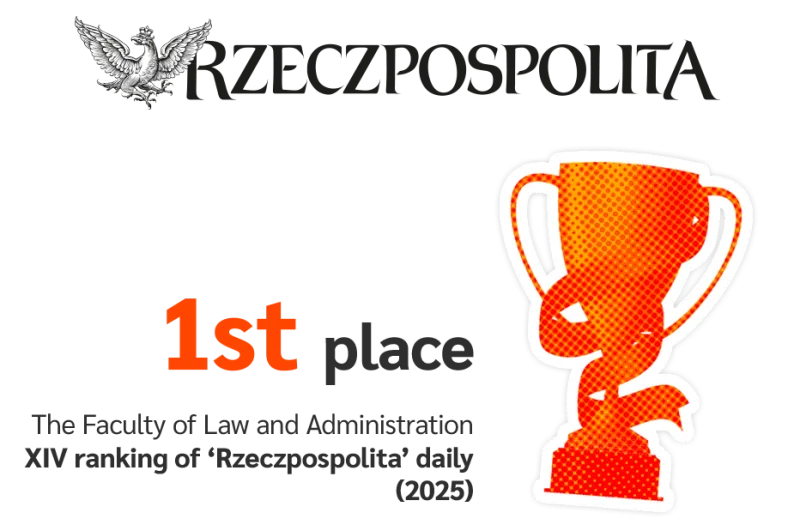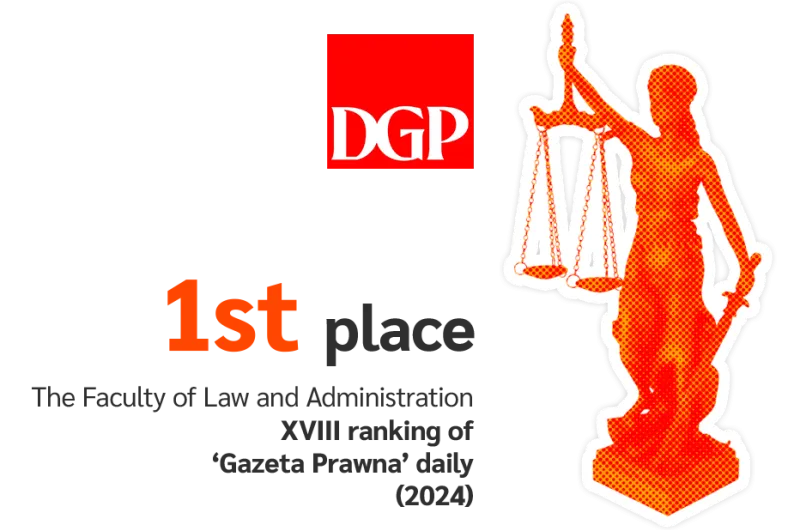If you want to know:
- how he almost became a PE teacher;
- whether he was an exemplary student;
- why he doesn't like series (except the one about Michael Jordan)
- what he considers to be the strength of his character;
- what films he recommends for autumn evenings.
And also, many other interesting things, I invite you to read the interview with professor Gwiazdowski.
<strong>What irritates you and what fascinates you about being a lecturer?</strong>
Maybe let's start with things that fascinate me. I talked to my colleague, who still lectures law at the University of Warsaw, about what we are doing at universities still, having an attorney practice and lots of other business activities. We came to the conclusion that this is your youth. We have been dealing with twenty-year-old people for 35 years. We are in a company that rejuvenates us. The second thing is that we want to educate you well for the sake of our pensions (laughs). It would be good for your generation to learn more than less, because then you will be able to support your parents and grandparents. In my generation, it is so good because I am a post-war boomer, and you are already from a demographic decline.
From the negative things - you know less and less. I am sorry to say that, but the knowledge of today's student from the first year after elementary school or middle school is indeed very poor. You've been taught to solve tests, so it's hard to switch you to critical thinking. You had a frame of thought, and, therefore, the dumbest way to teach. The reason for that is the fact that it's cramming, but science is creative. We must constantly question the theses that already exist, otherwise we will fall into dogmas.
<strong>What prompted and inspired you to study law?</strong>
I had two options in my life. I was very fascinated by sport. When I was young, I lived near the Orzeł Stadium, so it was impossible not to play sports ... So I wanted to go to the Academy of Physical Education and then study journalism. Bogdan Tomaszewski was my idol. The option was the following. If I didn't manage to join the journalism program and become a sports journalist, I could always become a flip teacher. Let's remember that there is a quiet job at school, because it was a period of hard communism.
The second option was to become a lawyer. In both options you have to talk a lot. I've never lacked it. Due to my mother's illness, I was dealing with a solicitor from the company for which she worked. It was 12:00 when I called and heard that the patron has not been there yet. I went to play football with guys and called for second time around 14:00. Then I found out that the patron was no more there and I came to the conclusion that it was a job for me (laughs). You don't have to sit in one place – that was the reason.
<strong>What are your interests besides scientific work? How do you spend your free time (if you have any)?</strong>
Firstly, mountains. Secondly, skiing, when it comes to sports. Thirdly, TV (laughs), which is traditionally more interesting matches. Football, handball, volleyball and basketball, of course, at the highest level, because I do not watch the Polish league.
<strong>If you choose a place for rest, for example for a holiday, do you choose mountains, sea, lake or…?</strong>
Mountains and lakes. Sea is definitely in third place. The best places are where there are lakes and mountains in the same place. I feel great in Zurich. I feel very well at Geneva Lake. In Poland, there are also such places as Solińskie Lake. Since I moved out of Warsaw 11 years ago, I have my own asylum near the forest now and I have a good rest there too.
<strong>Do you watch series? Movies? Do you go to theaters? If yes, what is your favorite series, movie or spectacle?</strong>
I don't like watching series, but sometimes I get involved, like recently in "The Last Dance". The reason why I don't like it is the fact that it eats up time. From my childhood, I remember ‘More Than Life at Stake’, ‘Black Clouds’ and ‘Four Tank-Men and a Dog’. You waited for it. Back then, there was nothing to do. There was one channel on TV, then two. Plus, on those programs there were communists mainly. Today, there are so many cool things to read and watch when it comes to nature documentaries that series is a waste of time. As Misses said: ‘In life, there is one variable that stays not variable. It is time.’
I like to watch movies, but also in moderation. I do it relatively rarely. Of course, when it comes the law, the best films for me are: ‘12 Angry Men’, ‘The Firm’, ‘Runaway Jury’ and various kinds of western movies. I don't like comedies because comedy is basically what surrounds us. To continue, I hate all kinds of thrillers because I don't like to tense myself. Television has to relax me.
I haven't been to theaters for a few years now, but mostly because of the actors. How long Gajos can be watched even being one of the last great actors? If to take ‘Mozart’ with Tadeusz Łomnicki or "One Flew Over the Cuckoo's Nest", today's spectacles differ from them. It is better to keep the memory of those outstanding plays.
<strong>Could you recommend some compulsory writings, such a must have for every home library, for the interest of recipients? Of course, I mean the ones close to your heart or related to your activities.</strong>
Recently, I've been repeating Nassim Nicholas Taleb. I would highly recommend Kahneman's ‘Thinking, Fast and Slow’. It is very important to read things that are far from the field we are dealing with, such as Hawking's ‘A Brief History of Time’ or Mlodinov's ‘The Mathematics of Uncertainty’. These are the things that allow us to confirm the thesis ‘I know that I know nothing.’ In connection with things mentioned above, I constantly have to learn something.
<strong>Under which circumstances you started lecturing at Lazarski University? Did our university offer you the position? Or you came with the initiative to start working?</strong>
After my habilitation thesis, I received a proposal from my reviewer to transfer to Lazarski University. He was a professor at the Warsaw School of Economics, but he was about to switch to Lazarski University to the Faculty of Economics. I was tempted by the proposal to build a new quality at the university meaning combining law and economy, which could never have been done at the University of Warsaw.
I do not regret leaving the University of Warsaw because I know what ideological wars there are between the academic staff.
<strong>Why do you teach? After all, you could only work as a lawyer and not get involved in academic life.</strong>
During martial law, in the period in which I had the dubious pleasure of studying, I came to the conclusion that this entire law sphere was completely pointless. I escaped to the philosophy of law. I dealt with the history of political and legal doctrines and thoughts. I started working on it at university. After the first year, the exam went great, just like all others (laughs). The docent suggested attending his seminar in first year. Later, I received an offer to stay at the faculty. It was the moment when there were 7 places for the advocate position in Warsaw, with nine descendants of the current bar. My chances were limited.
There was going to be a row about my presence at the faculty. There were many voices against me. Nevertheless, I was offered to apply anyway. However, at that time, I would not be admitted by the Minister of Justice, a bitter communist in the government of General Jaruzelski, with whom I argued at the first faculty council, where I was representing students after the imposition of martial law.
Finally, I stayed at the faculty as a result of voting. The final score was 11:2 for my candidacy. This is because several professors had been on pilgrimage to Rome the week before and had an audience with the Pope. They didn't talk about me with certainty, but maybe some blessing came to them (laughs). They concluded that since General Jaruzelski announced a national reconciliation, it could be interesting to see what would come of this Gwiazdowski.
<strong>Do you treat teaching as a complement to your profession?</strong>
I consider this an even distribution. Working as an attorney, I deal with a different field than lecturing. It causes, I may say immodestly, greater development opportunities. I am not able to say what is more important to me.
<strong>You have completed an attorney application. Have you become an attorney through scientific activity?</strong>
I didn't make an application because I was writing a PhD. The plan was to apply for admission to solicitors after finishing my PhD, but the application was rejected. At that time, I had a choice: to try to apply and do this with my former students (laughs) or skip the application or do my habilitation. After doing habilitation, I could not be refused entry on the list. At that time, I was involved in academic activities and starting from 1992 I was in a partnership with prof. Leszek Falandysz, a friend from studies. After the death of prof. Falandysz, I was in a company and then went – if I can say so - on my own.
<strong>You seem to be an immodest person. What is your biggest disadvantage and advantage of your character?</strong>
Why? Advantages and disadvantages? Here you have it. I don't think modesty is a strong point of my character (laughs). I believe that my character's strength is certainly independence of thinking I have always looked for…. This is how I became an anti-communist. In 1968 there was a hockey match between the USSR and Czechoslovakia. Back then, as a boy, I watched it with my uncle and dad. While watching that match, I heard the comment, but it was completely different from reality. Alarmed, I asked my dad about it and he said to me: ‘You know, it's politics’ (laughs). Then I started to think critically, not listening to comments, but looking for information myself.
<strong>How do you evaluate 2020, what are your wishes/dreams for the new year?</strong>
Health. Although, Russians always wished themselves health, because they were saying that everything else can be bought or stolen. For a few years now, people started to wish me luck, because they say that everyone on the Kursk was healthy (laughs). You have to be lucky not to get sick.
This year went quickly due to quarantine. I feel sorry for contact with students. Despite an efficient computer program, I miss personal interaction.







